Religious Freedom Annual Review 2016: Recordings and Photos
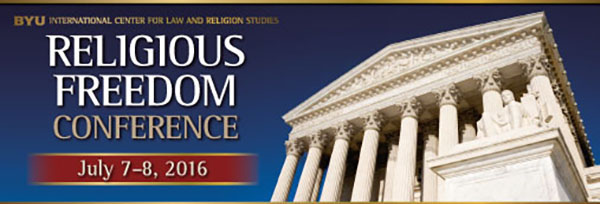
To access the recordings and photos from the July 2016 Religious Freedom Annual Review, please click here.
The Religious Freedom Annual Review: Provo, Utah, 7-8 July 2016
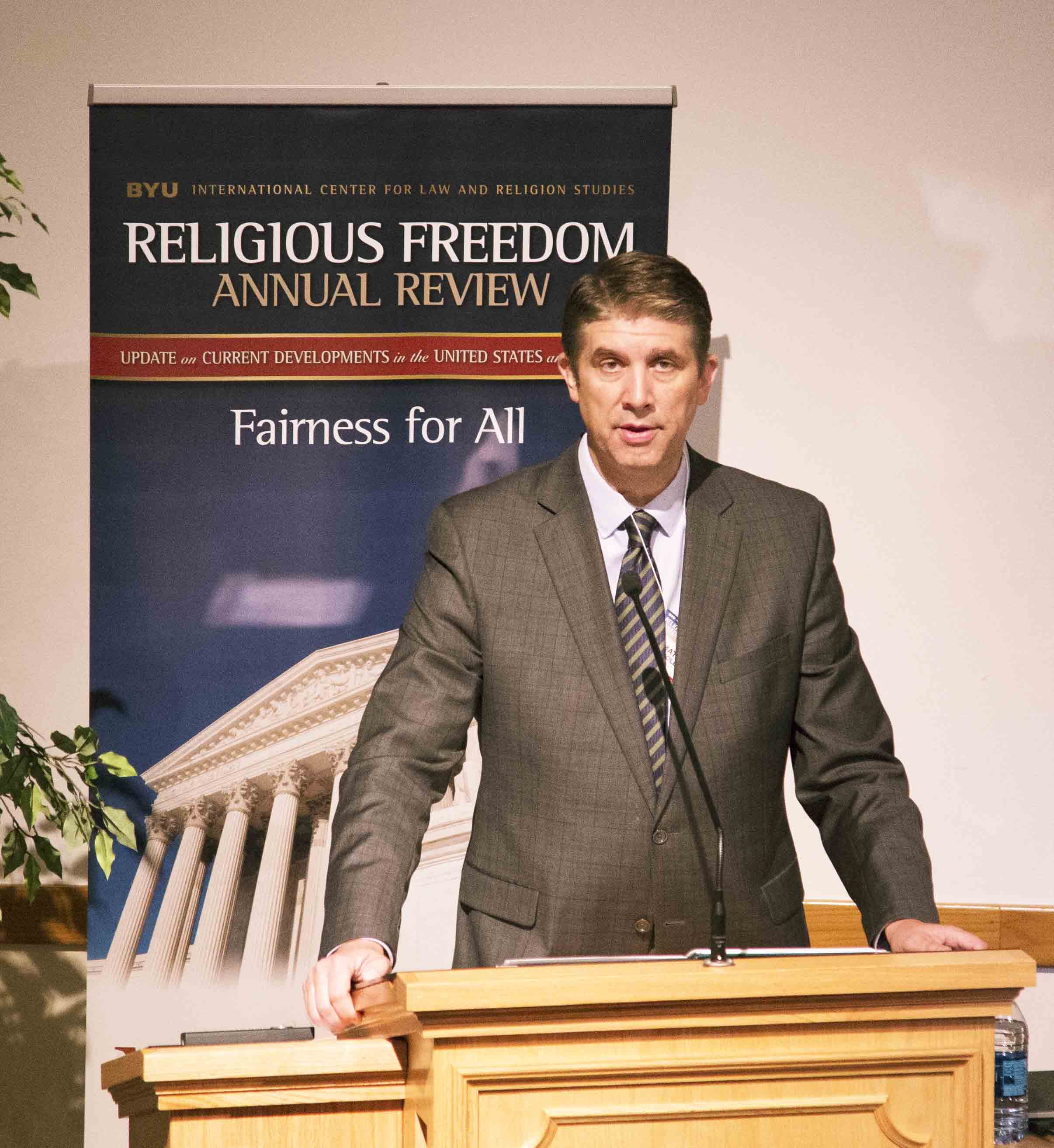
The 2016 Religious Freedom Annual Review of the International Center for Law and Religion Studies (ICLRS) has concluded at Brigham Young University. Keynote speakers for the event, which took place 7-8 July 2016 in BYU Conference Center, were Elder Lance B. Wickman, General Counsel and Emeritus General Authority of the Church of Jesus Christ of Latter-day Saints, who opened the conference with an address “Promoting Religious Freedom in a Secular Age: Fundamental Principles, Practical Priorities, and Fairness for All”; and Matthew S. Holland, President, Utah Valley University, whose remarks were titled “Religious Liberty v. Secularity: Is the American Founding Still Useful?“
To access the recordings and photos from the July 2016 Religious Freedom Annual Review, please click here.  …
Religious Freedom Annual Review 2016 Opening Keynote: Defending Religious Freedom in a Secular Age
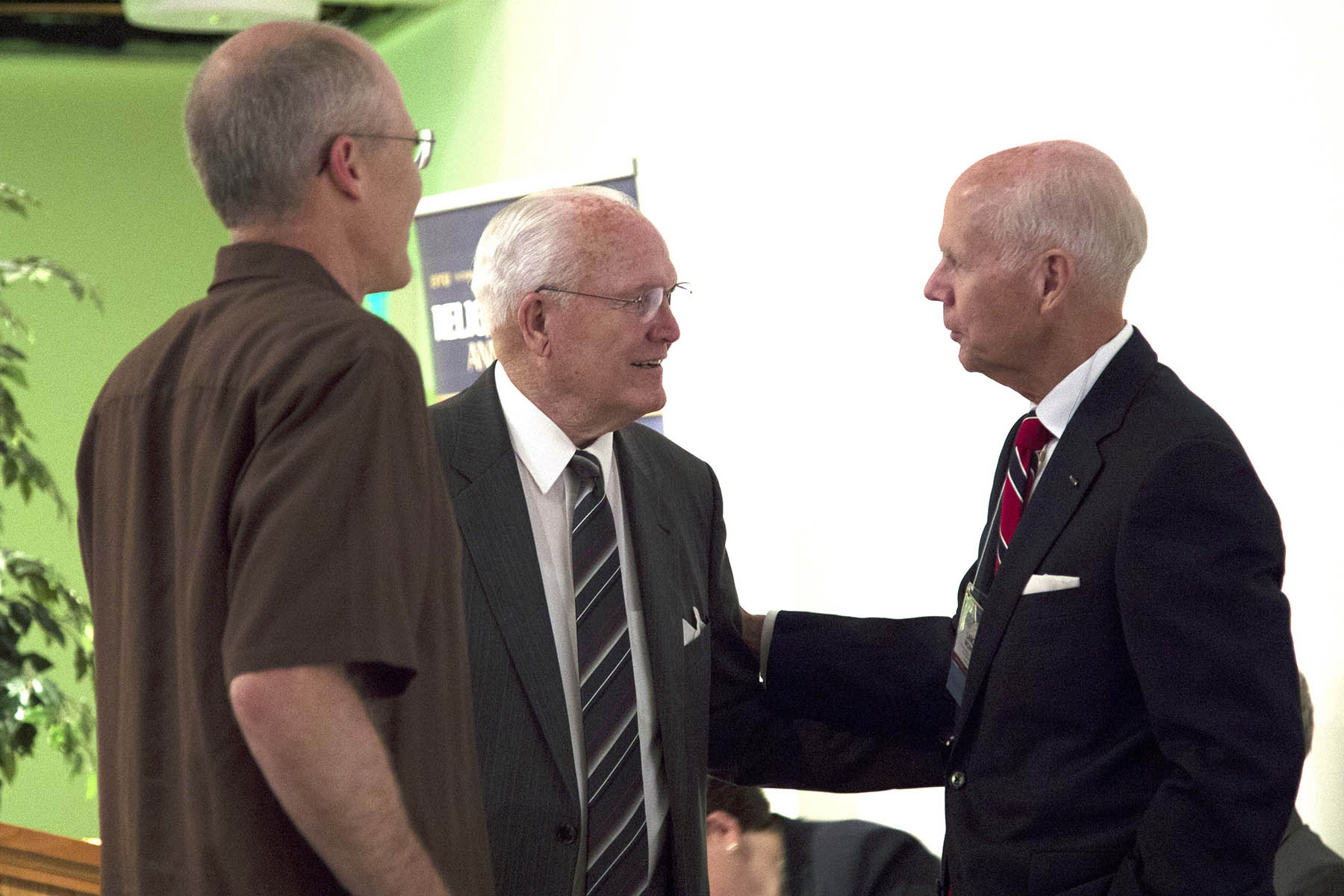
by Thomas Palmer
The Religious Freedom Annual Review opened on Thursday, 7 July 2016 with keynote speaker, Elder Lance Wickman, General Counsel, The Church of Jesus Christ of Latter-day Saints, and Emeritus General Authority. His presentation was titled “Defending Religious Freedom in a Secular Age: Fundamental Principles, Practical Priorities, and Fairness for All”.
Elder Wickman began with the premise that religious liberty is the cocoon in which agency survives. However, current threats to religious freedom are very real and are growing rapidly. Elder Wickman quoted a law professor, recently cited in a New York Times article: “If I were a conservative Christian (which I most certainly am not), I would be very reasonably fearful, not just as to tax exemptions but as to a wide range of other programs — fearful that within a generation or so, my religious beliefs would be treated the same way as racist religious beliefs are.” As evidence of this changing atmosphere, Elder Wickman cited a few examples. Although the First Amendment remains in force to protect against outright oppression, it may not protect against subtler forms of discrimination such as unfair zoning that prevent churches from being built.
Elder Wickman advised that as advocates we should be peacemakers; we need to understand which are our core priorities so we may know where to compromise and where to be unyielding. It is not to suggest that freedoms that are not essential should not be advocated for, because they should. But we risk losing essential rights if we are unwilling to compromise in certain issues of less importance. Core freedoms according to Elder Wickman are fundamentally private: freedom of belief, freedom to share your beliefs, freedom of internal affairs of churches, freedom of education, and religious training for children. These freedoms are non-negotiable. Atheists and other non-believers have the same rights as religious people to speak and lobby for their interests. These freedoms are also non-negotiable.
We can’t expect the Supreme Court to turn everything into a right by hearing every case indicated Elder Wickman. Values that are protected in the bill of rights are not banished from the political process. The Constitution was never intended to make us lazy and complacent, but rather it created a framework to make sustainable compromises and advocate for our positions. Elder Wickman urged the audience to become informed about religious freedom issues, learn to speak up with civility, do their individual part to defend religious liberties, and be “an example of the believers.”
Religious Freedom Annual Review 2016 Second Keynote Speaker: Religious Liberty v. Secularity: Is the American Founding Still Useful?
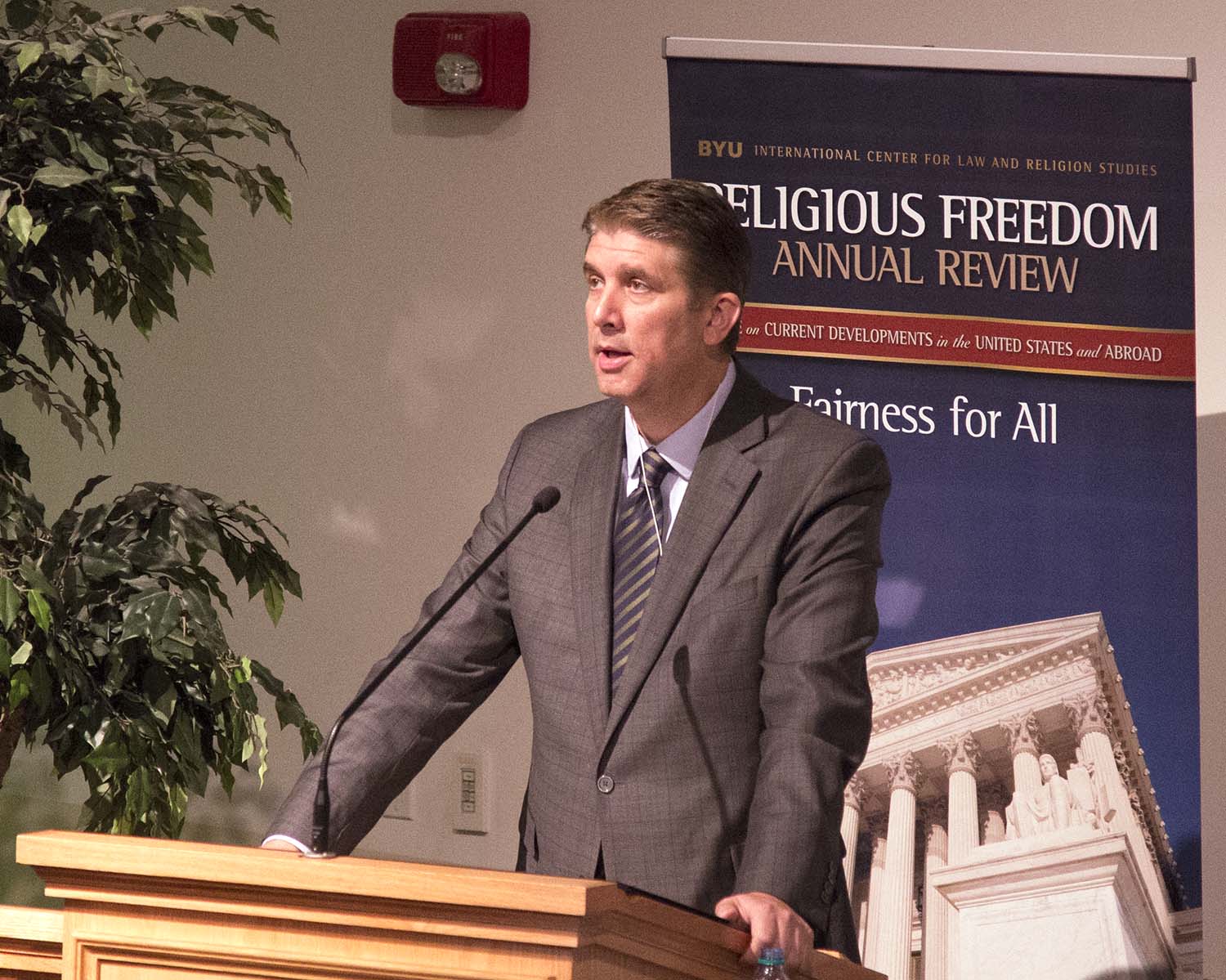
by Grace Hansen
Matthew S. Holland, president of Utah Valley University, kicked off the Annual Review as the second keynote speaker of the event on Thursday, 7 July 2016.
In his speech, entitled “Religious Liberty v. Secularity: Is the American Founding Still Useful?” Holland reminded the audience that “belief in God is no longer axiomatic.” Quoting statistics from Pew Research, he said, “There has been a marked increase in unaffiliated people, especially in the younger generation.” He then explained that for the first time in American history, one-third of adults under 30-years-old identify as religiously unaffiliated.
Despite the shift in national religious sentiment, Holland still believes the American founders and the principles they provided in the Constitution and Bill of Rights are still directly relevant to today’s population. “The founding becomes a sort of national Rorschach test,” Holland said. “With people seeing what they want.” He then elaborated on that point by outlining three ways in which the founders’ actions are still applicable: context, text, and character.
In an example later characterized as “surprising” by an audience member during the question and answer session, Holland explained that the New England Puritans provided a relevant, if narrow, example of context through successful separation of church and state. He illustrated the point by pointing out the Puritans’ progressive use of jury trials, governmental checks and balances, and written body of fundamental liberties.
“Religion,” Holland said, “is not too pointless or too poisonous to be given special protections in the law.” Holland continued by pointing to the specific text of the First Amendment, from its phrasing to its placement in the Bill of Rights. He explained that Congress considered 25 separate drafts of the religion clauses, with the final draft coming from a joint committee of the House and the Senate. Quoting Mike McConnell, Holland said, “The framers of our Bill of Rights thought that religious freedom deserved double barrel protection.” He stated that religious freedom was “America’s first liberty” and that it is a gift to be protected and preserved.
Holland closed by discussing character, specifically the character of a free people. “Together we must try to do what the best of the founding generation did,” Holland said. “They were not perfect, and we won’t be either. But surely we can try, as they seemed to try.” He then reminded the audience that the work they are committed to doing is “among the weightiest of our day.” Referencing John Jay, Holland concluded, “By all means, dismiss from your mind all useless apprehensions as well as all vain hopes. Let us calmly do our duty, and refer events to Providence.”
Religious Freedom Annual Review 2016 Thursday Afternoon Workshop: Understanding Media Coverage of Religion
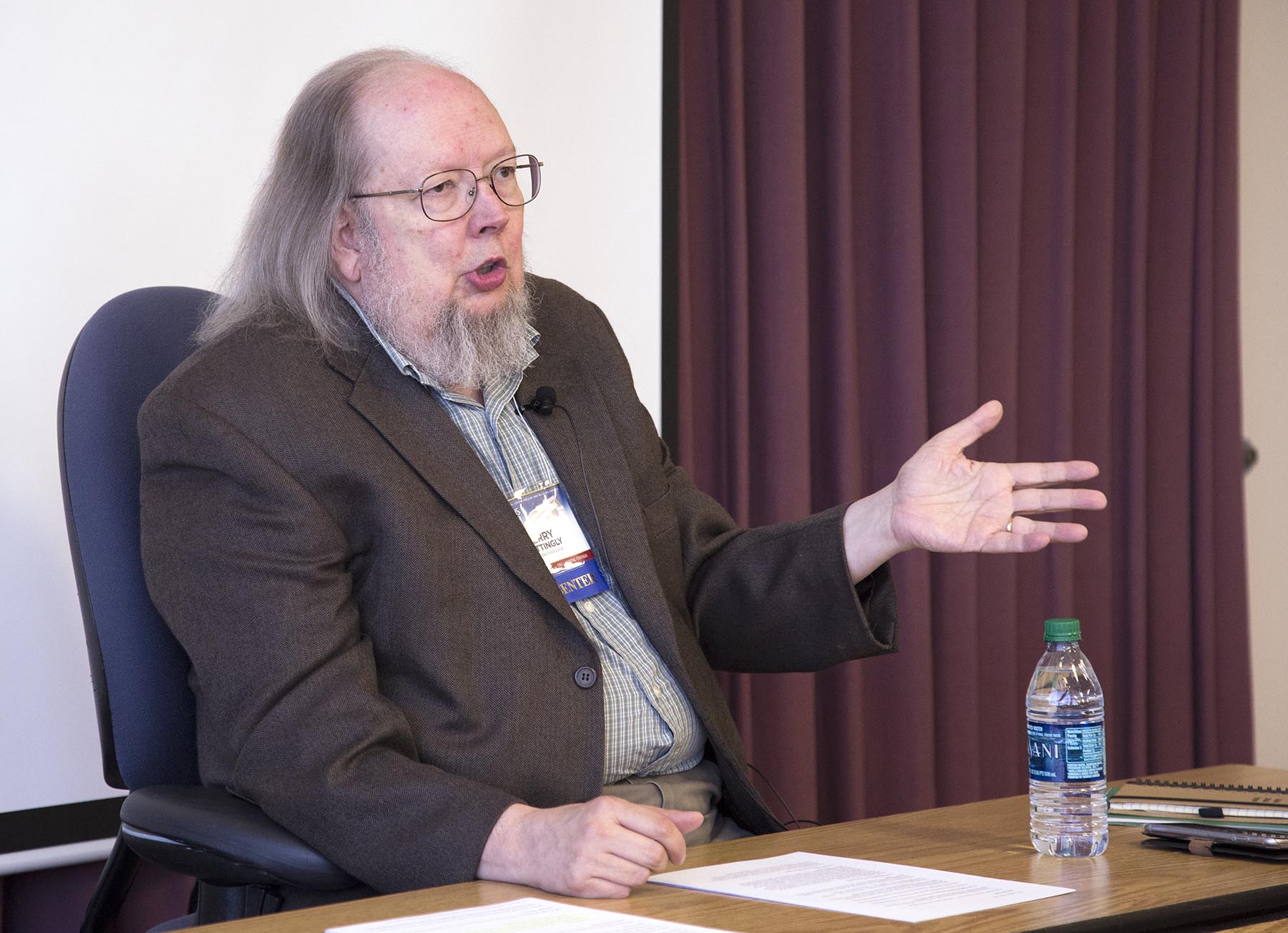
by Ryan Hughes
Terry Mattingly, nationally-syndicated religion journalist and founder and editor of GetReligion, as well as Senior Fellow for Media and Religion at The King’s College in New York City, spoke on Thursday, 7 July 2016 on how the media chooses to portray religious freedom issues and what can be done to make these portrayals more accurate. Professor Mattingly traced the history of press coverage on this topic and made a list of recommendations to help religious liberty advocates make sure their voices are fairly represented…
Religious Freedom Annual Review 2016 Thursday Afternoon Workshops: What does the Separation of Church and State Really Mean? The First Amendment’s Establishment Clause
by Jacob Crump
Professor Mark Goldfeder, Director of Law and Religion Student Program and Spruill Family Senior Fellow in Law and Religion, Emory University School of Law, presented on the topic of “What Does the Separation of Church and State Really Mean?” during the first day of the Religious Freedom Annual Review. Prof. Goldfeder began with an examination of both the Establishment and Free Exercise clauses in the First Amendment to the US Constitution. These clauses, Prof. Goldfeder explained, have very different aims and can occasionally be in tension with each other.
First, Prof. Goldfeder posed the question “How do you define religion?”. This question, though seemingly simple, is actually incredibly nuanced and complex, especially in the legal realm. How one defines “religion” has significant impact on the interaction that government and law will have with that religion. Prof. Goldfeder’s claimed that “it is literally impossible to define religion” in a single way. This has contributed to the sometimes confusing First Amendment jurisprudence from the United States Supreme Court.
Prof. Goldfeder then traced some important Free Exercise and Establishment jurisprudence from the Supreme Court. Beginning with early cases about public buses being used to transport children to religious schools, Prof. Goldfeder pointed out that the Supreme Court’s jurisprudence in this arena seems contradictory and sometimes confusing. While the Court often appears to take a separationist stance, it has also frequently adopted accommodationist principles in order to attempt to balance religion and government. Prof. Goldfeder’s conclusion is that “the Court does what it wants to do” by attempting to reach outcomes that are most beneficial for society in general.
Religious Freedom Annual Review 2016 Thursday Afternoon Workshop: Muslims, America, and Religious Freedom
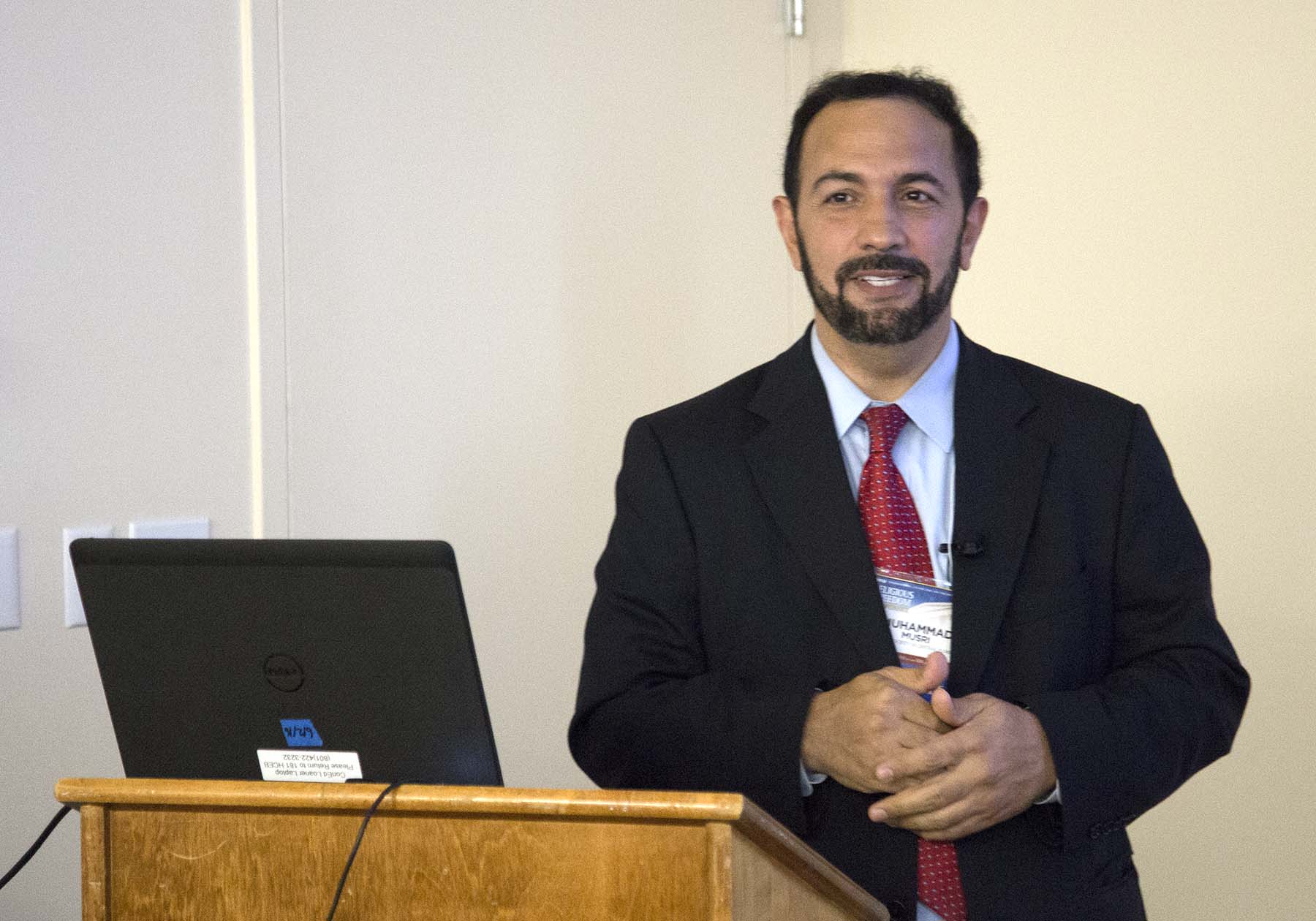
by Reed Adlish
In his Thursday, 7 July 2016 workshop, “Muslims, American, and Religious Freedom”, Imam Muhammad Musri emphasized that Muslims have much more in common with other faiths than is often reported. Imam Musri, Senior Imam, President and Chairman of the Board of the Islamic Society of Central Florida, shared statistics that the vast majority of violent acts carried out by Muslims occur against other Muslims (and not against non-Muslims), and are usually politically motivated. Despite this fact, there is still a big gap as to how Muslims are perceived in the United States. Imam Musri showed recent data which indicates that among Evangelical Pastors, a large portion view Islam as a threat and believe that it has very little in common with modern Christianity. Imam Musri stated that, in actuality, Islam and Christianity are very similar.
Imam Musri also explained that as a result of the misinformation disseminated by several mainstream media outlets, there is a growing tide of anti-Islamic sentiment. He showed clips from prominent news organizations that depict Muslims as terrorists, and show citizens taking up arms in order to protest the presence of Muslims within the country. By focusing on similarities rather than differences between religions and people, Imam Musri believes peace can be had by all.
As an example, Imam Musri illustrated the disparity in how the media reports mass shootings. In the Orlando nightclub shooting, it was widely reported that the shooter professed a belief in Islam, while the religion of the shooter in the Sandy Hook massacre was rarely brought up in the national dialogue. Additionally, the first FBI responder in the Orlando shooting, who heroically saved lives, was a practicing Muslim, but this fact, according to Imam Musri, was also not reported. Imam Musri concluded by encouraging the facilitation of a dialogue between people of all faiths, and by encouraging non-Muslims to get to know other Muslims, in order to break down several barriers that contribute to Islamophobia.
Religious Freedom Annual Review 2016 Thursday Afternoon Workshops: How Can I Discuss Religious Freedom Effectively?
by Linda Young
Michael Frandsen, Director of Public Affairs for The Church of Jesus Christ of Latter-day Saints, presented a workshop titled “How Can I Discuss Religious Freedom Effectively” on Thursday 7 July 2016. He explained that citizens can stand up for truth while practicing tolerance. Using an example provided by LDS Apostle, Dallin H. Oaks, absolute truth is like a coin; one side represents tolerance and respect while the other side represents truth.
A recently produced video by the LDS Church was shown of one student’s experience defending truth.
Three possible ways to proceed were suggested: 1) Show love and compassion for all people without abandoning truth. 2) Address disagreements one on one if possible rather than in a group setting. 3) Be patient. Understanding is a process and takes time to develop.
Mr. Frandsen provided several questions with suggested responses.
Q. What do you mean when you talk about religious freedom?
A. Religious freedom is the right to choose, change, declare and act upon your faith. It includes freedom to worship. It is also the right to “exercise” or practice your religion without interference from the government, subject to government’s responsibility to protect the health and safety of all its citizens in a pluralistic society.
Q. How can religious freedom be threatened when it’s already protected in the First Amendment?
A. The First Amendment protects religious freedom in important ways, we know that legal protections alone, even those provided by the Constitution are not always sufficient. Lance Wickman, General Counsel, The Church of Jesus Christ of Latter-day Saints, suggested at the opening session, that we cannot rely heavily on the First Amendment.
Q. I am not religious. Why should I care about religious freedom?
A. Religious freedom protects the space we all need to live according to our most deeply held beliefs and values allowing freedom to act according to our conscience.
Q. Why should religious views have legitimacy in the public square?
A. Every policy choice is based upon moral assumptions and values. At some point everyone makes a determination about what is right and wrong.
Q. Why does the church oppose same-sex marriage?
A. First, the Church believes that strong, stable families led by a father and mother provide the best environment we have for bring children into the world and raising them. We should do everything we can to protect that environment. Second, the Church is concerned that legalizing same-sex marriage substantially reduces the space available to people of faith who have traditional beliefs about marriage and family. Marriage between a man and a woman has always been a core doctrine. Our ability to remain true to all aspect of this core doctrine is increasingly challenged where same-sex marriage is now legal.
Mr. Frandsen’s concluding counsel included a two-fold plea to lead lives as examples of the believers so that faithful objectives can be seen as good and decent. Then, become active in simple ways by becoming aware of community issues and voting.
Religious Freedom Annual Review 2016 Thursday Afternoon Plenary: Political Trends and Religious Freedom: Where Are We and Where Are We Going On Religious Freedom Issues Nationally?
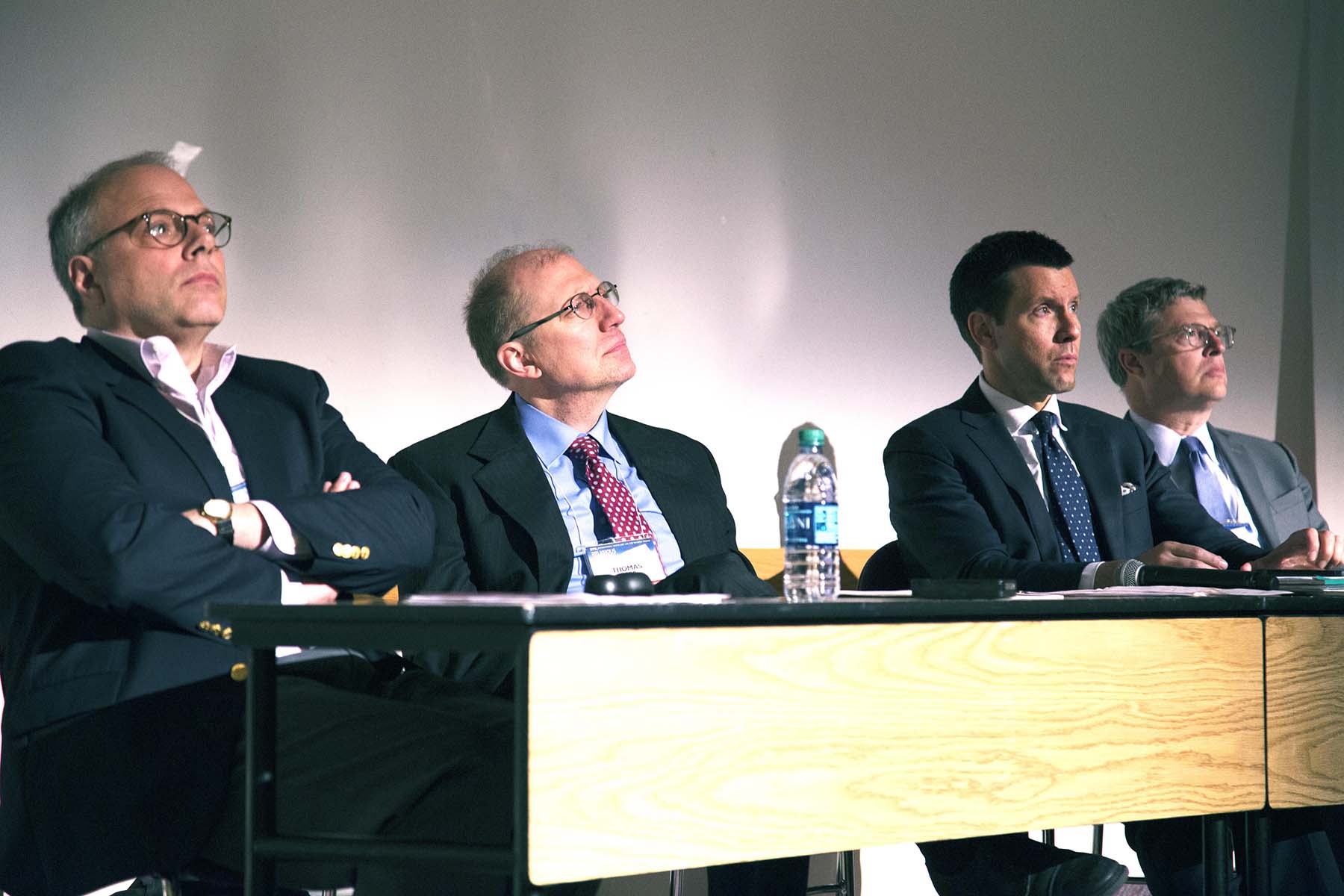
Reported by Jarom Blackhurst
This session was moderated by David M. Kirkham, Senior Fellow for Comparative Law and International Policy, International Center for Law and Religion Studies, J. Reuben Clark Law School, Brigham Young University. The panelists were David Masci, Senior Writer/Editor, Pew Research Center; Thomas C. Berg, James L. Oberstar Professor of Law and Public Policy, University of St Thomas School of Law; Tim Schultz, President, First Amendment Partnership; and Brett G. Scharffs, Francis R. Kirkham Professor of Law and Director of the BYU International Center for Law and Religion Studies, J. Reuben Clark Law School.
David Masci, a Senior Writer/Editor from the Pew Research Center, began his remarks by asking the question: are we a religious country? He proceeded to discuss the question by citing studies conducted by the Pew Research Center over the past few years. The studies compared Americans’ responses to questions about religious belief and activity with responses of people from other countries. After comparing the United States with other western countries he showed the changes in responses over the past few years within the United States. He then focused on responses during election years and consistencies between religious activity and presidential candidate preferences.
Thomas C. Berg, James L. Oberstar Professor of Law and public Policy at the University of St Thomas School of Law, talked about society’s increasing polarization and heightened rhetoric. He pointed out that attacks on Christian conservatives and Muslims often mask a deeper issue that is not being resolved. He discussed the similarities and differences between Christian conservatives and Muslims and what they are currently experiencing in the United States.
Tim Schultz, President of First Amendment Partnership, talked about working with state legislatures on religious freedom. After pointing out that working with state legislatures is easier than working with the Federal government. In his discussion about religious freedom in the states he focused on three things. 1) What has happened, 2) why it has happened, and 3) what will happen.
Brett G. Scharffs, the Francis R. Kirkham Professor of Law and Director of the BYU International Center for Law and Religion Studies at J. Reuben Clark Law School, started by mentioning recent Religious Freedom Restoration Act controversies in Arizona and Indiana. Religious freedom is increasingly politicized with Religious Freedom Reformation Acts getting headlines designed to scare. He then discussed three ways to reduce the perceived conflict between religious freedom and LGBT rights. 1) Realize the dialogue about religious freedom is politicized, 2) everyone feels threatened, and 3) get out of the deadlock of the perceived zero-sum game.
Religious Freedom Annual Review 2016 Friday Morning Plenary Session: What Should Religious Freedom Mean in Society? Prioritizing Religious Freedoms
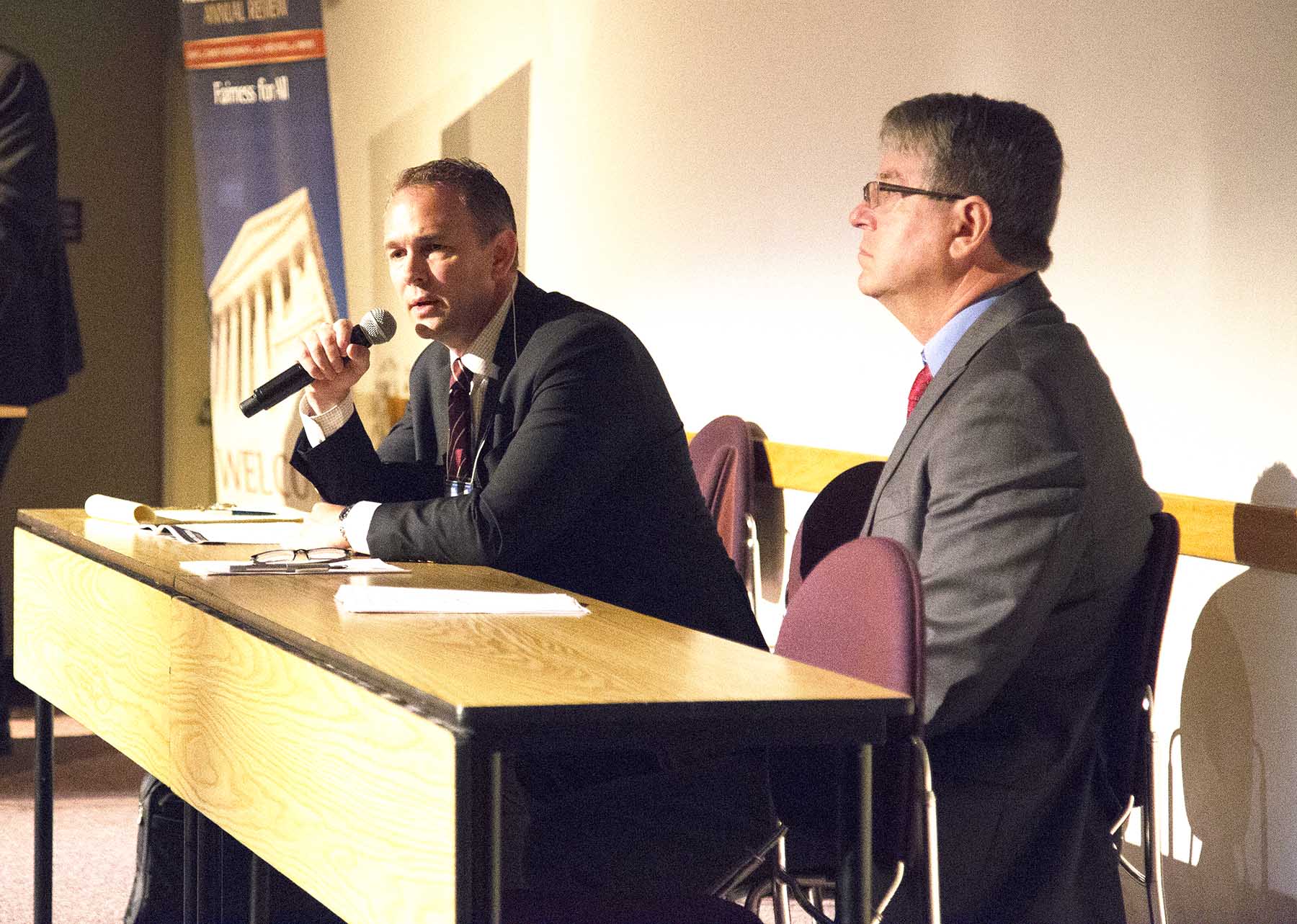
by Joshua Prince
In the opening plenary session of the second day of the conference, W. Cole Durham, Jr., Founding Director of the International Center for Law and Religion Studies moderated a discussion between Alexander Dushku, a shareholder at Kirton & McConkie, and Steven D. Smith, Warren Distinguished Professor of Law and Co-Executive Director, Institute for Law and Religion, University of San Diego School of Law. Both Alexander Dushku and Steven D. Smith spoke on the issues threatening religious freedom in the United States. Each diagnosed the problem that religious freedom is facing differently; Dushku attributed the decline in religious freedom to an increase in individualism which views religion as something tyrannical, rather than empowering, while Smith attributed it to a decrease in religiosity as a whole, what he called a movement from the dual sovereignty of “God and Caesar” to one of Caesar alone.
Alexander Dushku prescribed four “Religious Freedom Imperatives” to reverse course and reprioritize religious freedom:
1.We must have a clear understanding of the cultural moment.
2.We must speak on and advocate religious freedom.
3.We must not overreach – we need to prioritize which freedoms are most vital and start there.
4.We need to get involved in defending religious freedom in meaningful ways.
He commented how religion can seem to be quite contrary to the individualism of the day, and mentioned that it is for that reason that we must use personal narrative to describe the effects of religious freedom, or the lack thereof, on our lives. Too often we frame religious freedom as a constitutional right, an argument that in our contemporary age is no longer persuasive. If we are to be successful at defending religious freedom, we should frame it as an individual freedom instead. Mr. Dushku mentioned that we live in a time where it is incredibly important to first be true to yourself and second, never stand in the way of others being themselves. It is within this framework that we must work.
Steven D. Smith spoke of a decline in religiosity as a cause of declining religious freedom. He cited the country’s history and how in the past, there was a “Christian or biblical regulatory ideal” where both religion and government were important parts of people’s lives. Since then, there has been “not just a different, but a fundamental reorientation” of society. He spoke of how the government today, in light of this decline in religiosity, makes accommodations for many different reasons yet fails to make them for religious freedoms. Professor Smith mentioned that this fundamental reorientation has resulted in a shift from God and Caesar as the two governing bodies in society to one of just Caesar, where the government is entrusted with much more than it would have been just fifty years ago.
Religious Freedom Annual Review 2016 Friday Morning Plenary Session: Interfaith Cooperation: How Can We Work Together to Promote Religious Freedom?
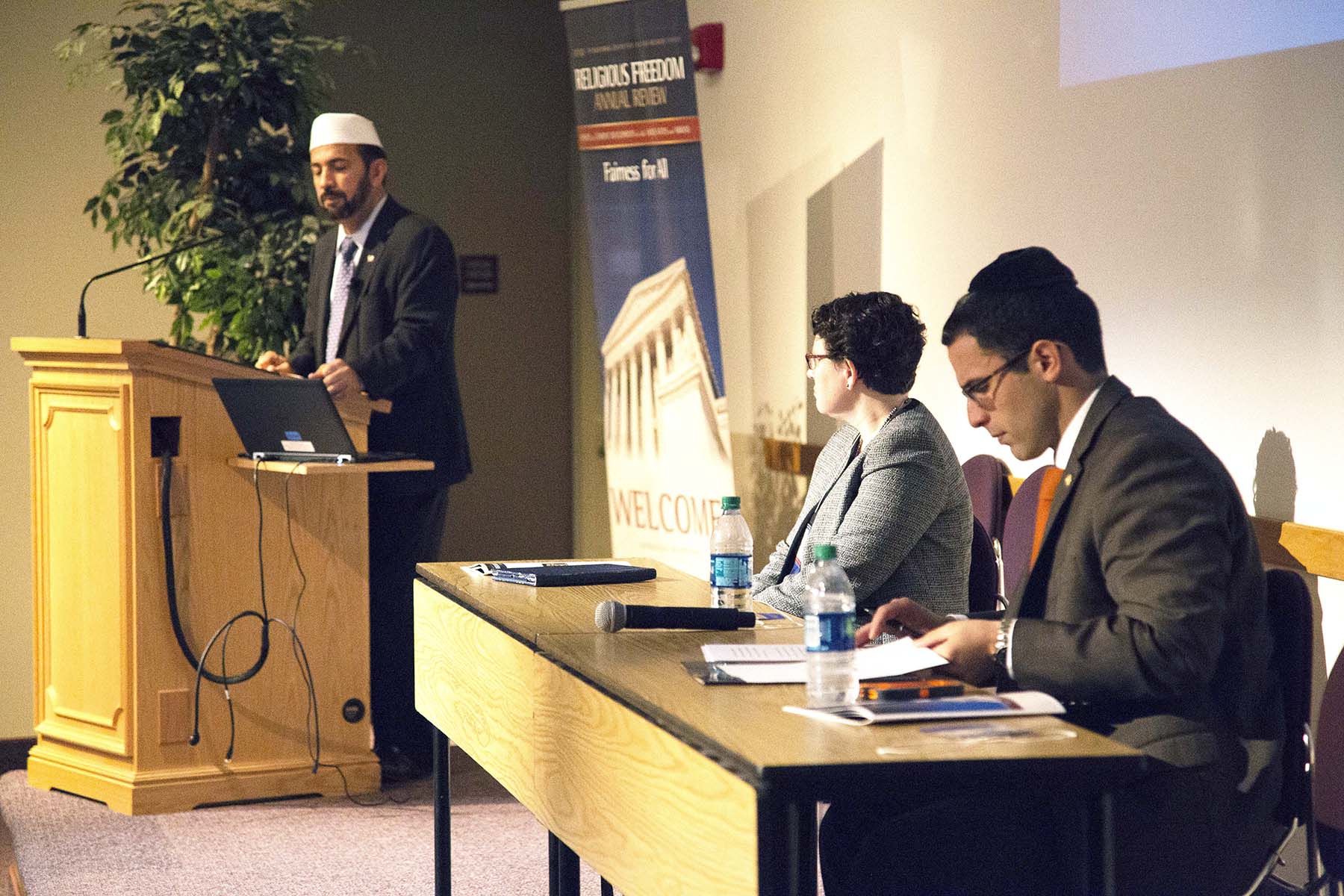
by Brenden Stuart
In the Friday, 8 July 2016 morning plenary session, moderated by Elizabeth A. Clark, Associate Director, International Center for Law and Religion Studies, J. Reuben Clark Law School, Brigham Young University, Imam Muhammad Musri and Daniel I Mark each spoke on how we can work together to promote religious freedom.
Imam Muhammad Musri, President and Chairman of the Board of the Islamic Society of Central Florida, gave his presentation titled “Interfaith Cooperation to Promote Religious Freedom in Muslim Majority Countries”. He discussed the activities he has pursued to foster interfaith cooperation between Muslims and Evangelical Christians in America. Activities fostering cooperation included interfaith groups building homes for the less fortunate, a Texas retreat attended by fifteen imams and fifteen evangelical pastors, as well as a conference in Washington attended by 150 imams and 150 pastors. Each of these events allowed both sides to share concerns and work on resolutions to improve. Muhammad Musri’s common theme throughout his presentation was the importance of focusing on the similarities between Islam and Christianity, rather than the differences.
In his presentation, “What Politics Can Learn from the Family: Jews, Latter-day Saints, and the Case for Religious Freedom”, Daniel Mark, assistant professor at Villanova University and member of the United States Commission of International Religious Freedom, discussed what politics can learn from families and, more specifically, what politics can learn about mercy. Daniel Mark begins his talk with the story of the Gibeonites who demanded that King David, in order to atone for King Saul’s past crimes against them, have seven of Saul’s male descendants executed. King David fulfilled this request but, as a result, the Gibeonites were never allowed to convert into Israel. Jewish interpretations of this ban explain that it was a result of the lack of mercy shown by the Gibeonites. Although they were entitled to demand justice, they should have chosen not to make this demand and shown mercy. Using this story, Daniel Mark helps us to imagine a world where mercy is shown within the political realm and people, although having a right to demand justice, may choose to be merciful and not always stand on those rights.
Daniel Mark explains the improvements that could be made if people treated strangers like they were family and then declared that American society needs “family home evening”. Within the family, the chief virtue is mercy, not justice, and family success does not come from family members standing on their rights but relinquishing them. One of the side-effects of modern liberalism’s focus on the individual is it undermines the effort to turn our society into a community or family. Therefore, defending religious freedom depends on promoting the family ethic within our communities so that society may be more inclined to relinquish their rights for the common good. Religious rights should still be robustly defended and respected but the free exercise of religious clause should not be invoked every time the government acts in a way that could be interpreted to infringe on personal religious freedom. By showing mercy, we can build a societal home, where we can all live together as a community and embrace differences, as opposed to building a hotel, where we section everyone off and allow them to be different in each of their respective rooms. As members of society get to know one another they can respect each other and religious freedom rights will be more protected.
In order to build this family ethic, religious believers need to be active within their communities. Getting involved with sports leagues, clubs, and other community groups creates a family like atmosphere in the community. These settings give people the opportunity to engage one another in settings outside of hostile politics or formal business. It is within these settings where those who value religion can show and share those values with others who, although they may not have faith of their own, can learn to respect religious beliefs and value their protection.
Religious Freedom Annual Review 2016 Friday Afternoon Workshops: How Broad is Religious Freedom? Constitutional and Legislative Protection
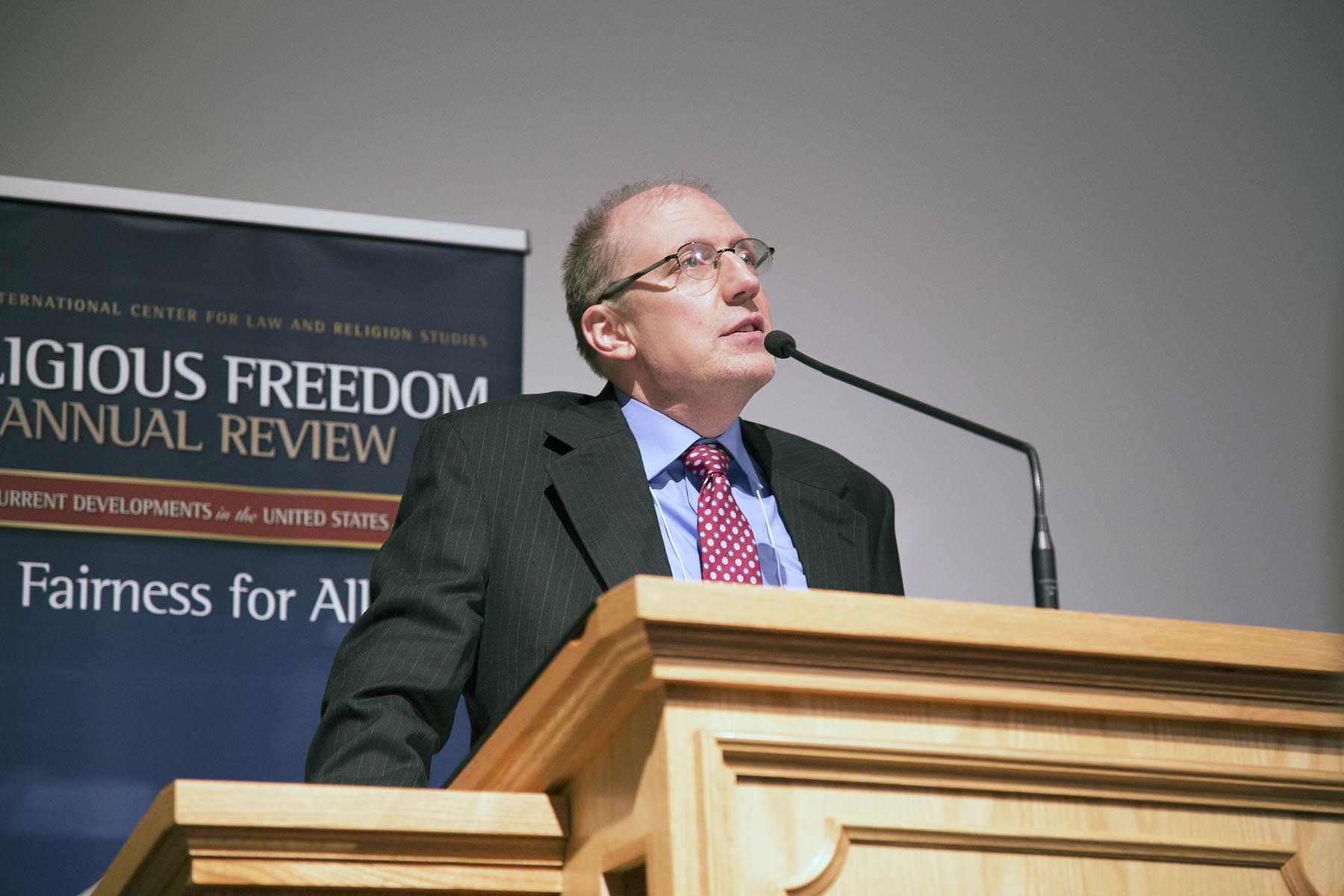
by Kaleb Brimhall
Thomas C. Berg, a James L. Oberstar Professor of Law and Public Policy at the University of St. Thomas School of Law, discussed the various areas where religious freedom issues commonly surface and explored the current state of the law in those respective areas in his Friday, 8 July 2016 Workshop titled “How Broad is Religious Freedom? Constitutional and Legislative Protections”.
In regards to Freedom of Speech and Freedom of Association, Professor Berg indicated that religious people hold fairly equal rights to those…
Religious Freedom Annual Review 2016 Friday Afternoon Workshops: Religion in the Workplace: Rights and Accommodations
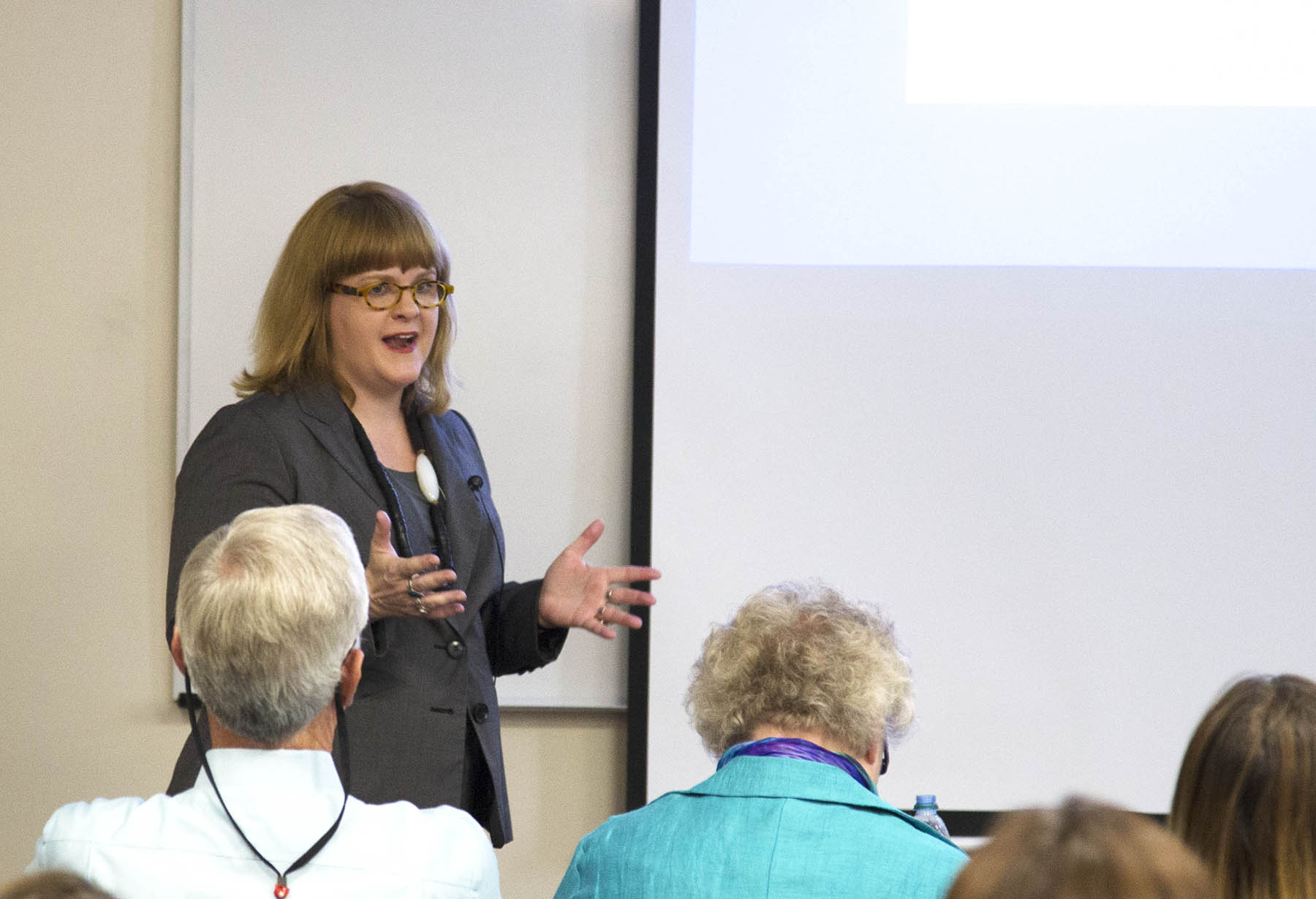
by Grace Hansen
M. Christian Green’s presentation, entitled “Religion in the Workplace: Rights and Accommodations”, began with a reminder from Sigmund Freud that “love and work are the cornerstones of our humanness.” But it was Green who, for the next forty minutes, explained why.
Ms. Green first introduced the theology of work, divided into three parts: (1) work creates an outlet for self-realization or self- expression; (2) work provides a means to earn a living; and (3) work becomes a contribution and a gift to the community. From there, she went on to explain that it is because of the significance of work that religion—perhaps one of the only equally influential pillars in people’s lives—should be protected within the workplace.
“There are three main types of religious discrimination,” Ms. Green explained. “Disparate treatment, disparate impact, and religious harassment.” She then followed up specifically on disparate impact, explaining that it was because of the somewhat ambiguous nature of the category that legislatures and courts often had trouble addressing issues concerning grooming and garb, conscientious objection, or Sabbath and leave.
Although Ms. Green explained religion in the workplace enjoys a long and complex jurisprudence, she pointed to seven specific Supreme Court cases that have provided the current balancing test used to determine whether employees have been given “reasonable accommodation” regarding their religious beliefs and practices without creating an “undue hardship” on the employer. Several of these cases, such as EEOC v. Abercrombie and Fitch and Obergefell v. Hodges, were decided as recently as 2015.
Ms. Green, a former researcher for the Religion, Culture, and Family Project at the University of Chicago and a current senior fellow at Emory University’s Center for the Study of Law and Religion, concluded by reminding the audience that despite the still shifting sentiment on religion in the workplace, the issue remains of peak importance because, again using the words of Sigmund Freud, “Love and work, work and love… that’s all there is.”
Religious Freedom Annual Review 2016 Friday Afternoon Workshops: Religion in Public Schools: What Rights do Parents and Students Have?
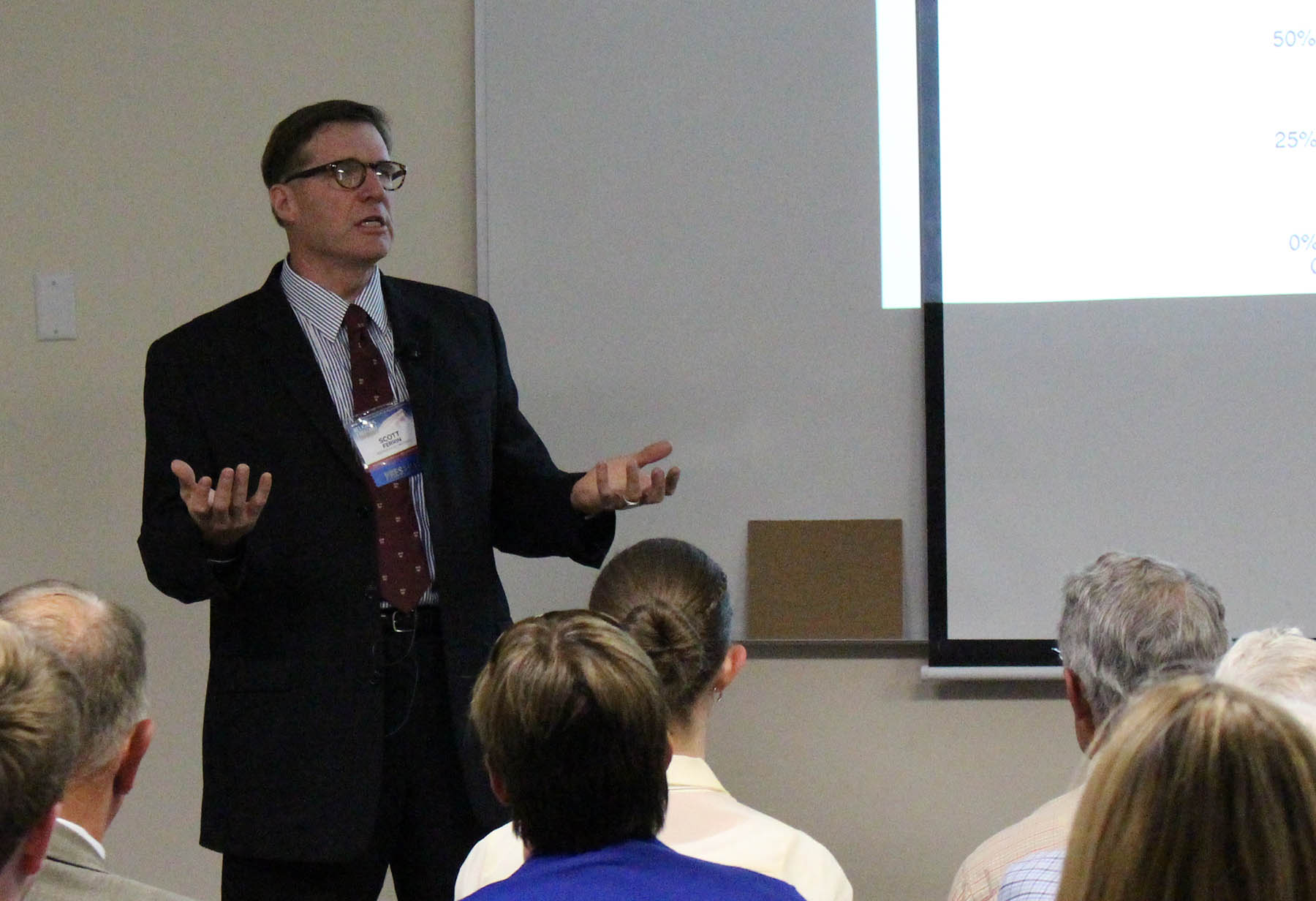
by Brittani Nelson
The workshop session entitled “Religion in Public Schools: What Rights Do Parents and Students Have?” took place on Friday afternoon, 8 July 2016, and was presented by Scott Ferrin. Professor Ferrin teaches at the David O. McKay School of Education at Brigham Young University. He is also an Adjunct Professor of Law at the J. Reuben Clark Law School at Brigham Young University.
Professor Ferrin’s presentation focused on the state of religious freedom in public schools. He briefly described how the public education system in Utah is designed. He emphasized that the curriculum is set by the State Legislature and that parents hoping to make changes to their student’s curriculum should focus their efforts on a legislative level.
He then discussed a few important cases and laws regarding religion in public schools. His main emphasis was on the Equal Access Act, which essentially states that if any non-curriculum clubs are allowed at a public school, then all non-curriculum clubs must be allowed (with the exception of discriminatory clubs or those that pose a health or safety threat). He also emphasized that although the school itself may not establish religious behaviors or persuade students to participate in such activities, the students themselves have a First Amendment right to express their religious beliefs.
Professor Ferrin’s friendly and entertaining presentation style facilitated quite a bit of audience participation, including questions about charter schools and requests for clarification regarding individual student rights. Professor Ferrin’s concluding piece of advice was to find and celebrate good research. He pointed out that the research regarding religion in schools is often flawed and misinterpreted. He encouraged participants to be a reasonable voice and a good example of religious believers in the educational setting. The answer, he said, was knowledge and love.
Religious Freedom Annual Review 2016 Friday Afternoon Workshops: How Do I Get Involved? Where Can I Make a Difference?
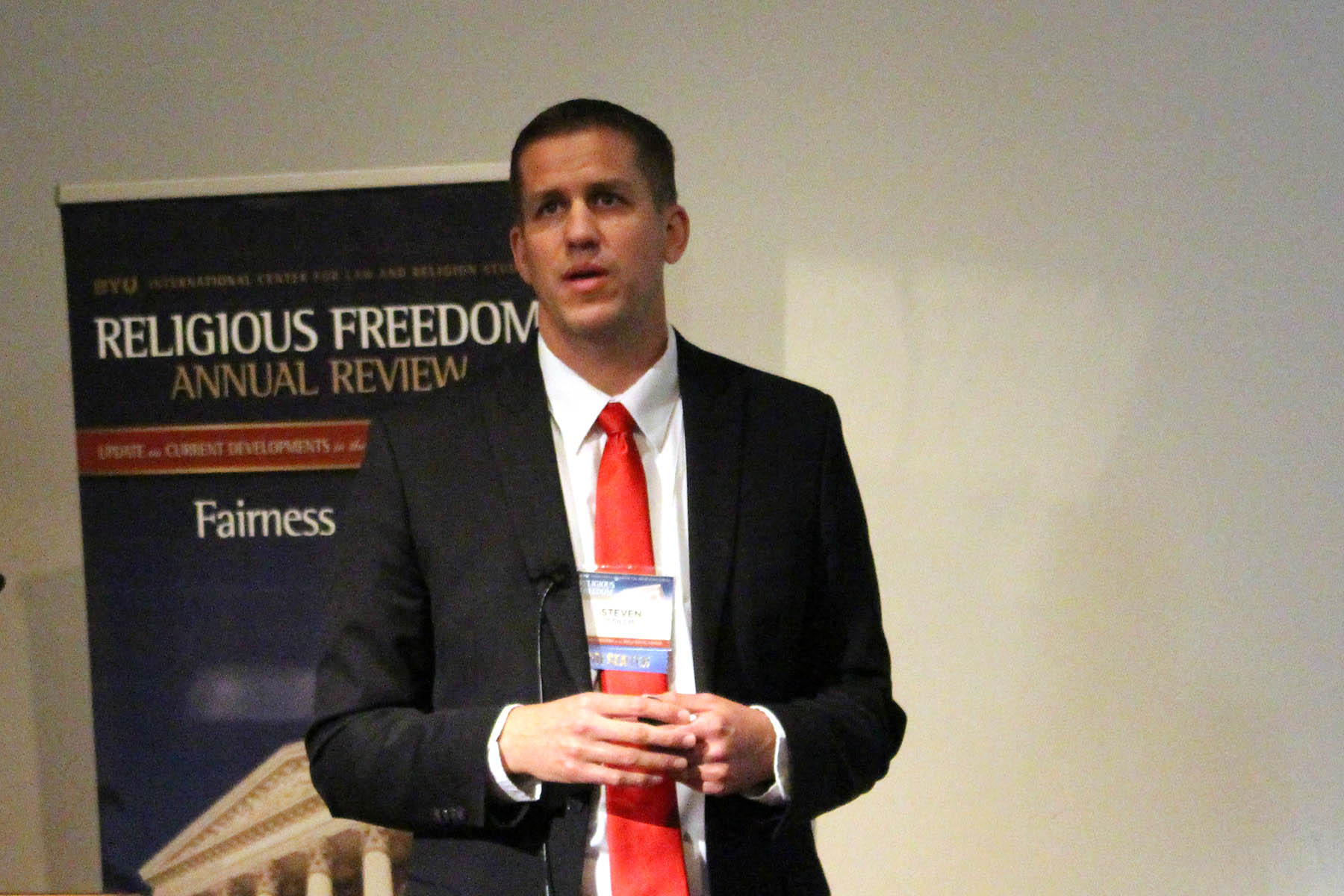
by Shad Larson
In this session, Steven T. Collis, Chair, Religious Institutions and First Amendment Practice Group, Holland & Hart, focused on what each individual can do to promote religious freedom. Mr. Collis pointed out what those who care about religious freedom sometimes do wrong and how that can hurt the cause. He specifically laid out three things that promoters of religious freedom have done over the years that make it difficult to secure religious freedom protections.
The first mistake religious freedom advocates make is promoting religious freedom only for themselves and trying to restrict it for others. This is in the context of the recent rise of Islamophobia and the desire to restrict Muslims rights, which has mostly come from the religious right. By doing this, those who oppose or who are on the fence about religious freedom protections are more likely to want to restrict religious freedom because they do not see it as a valid claim. The second mistake is promising that state Religious Freedom Restoration Acts (RFRA) do more than what they actually do. Promoters of religious liberty have mistakenly promised that RFRAs will protect religious objectors against LGBT anti-discrimination laws when in reality they do not. Thus, many people oppose the RFRA as anti gay legislation when in reality it is nothing of the sort and religious freedom is harmed by its failure to pass. The third mistake is refusing to compromise with the other side. As a result, critical opportunities to win real protections are lost and the opposing side loses interest in a constructive conversation about the issues. By making these three mistakes, religious freedom advocates can do more harm than good to the cause of religious freedom and time is running out to find real protections.
Mr. Collis then asked for those in the audience to look introspectively and ask themselves if what they were doing is good for religious freedom. He stated that none of us should sacrifice religious freedom as a short-term gain for perceived interests, such as restricting Muslims from coming into the country because it may be perceived as increasing national security. He put it perfectly when he said, “if anyone’s religious freedom is being burdened then everyone’s religious freedom is being burdened”. After taking the audience through various scenarios and soliciting audience feedback on appropriate responses to the situation, Mr. Collis concluded by pleading for everyone to get involved in a constructive manner to protect religious freedom because across the country it is losing its steam.
Religious Freedom Annual Review 2016 Friday Afternoon Plenary: Religious Freedom at the Supreme Court Now and in the Future
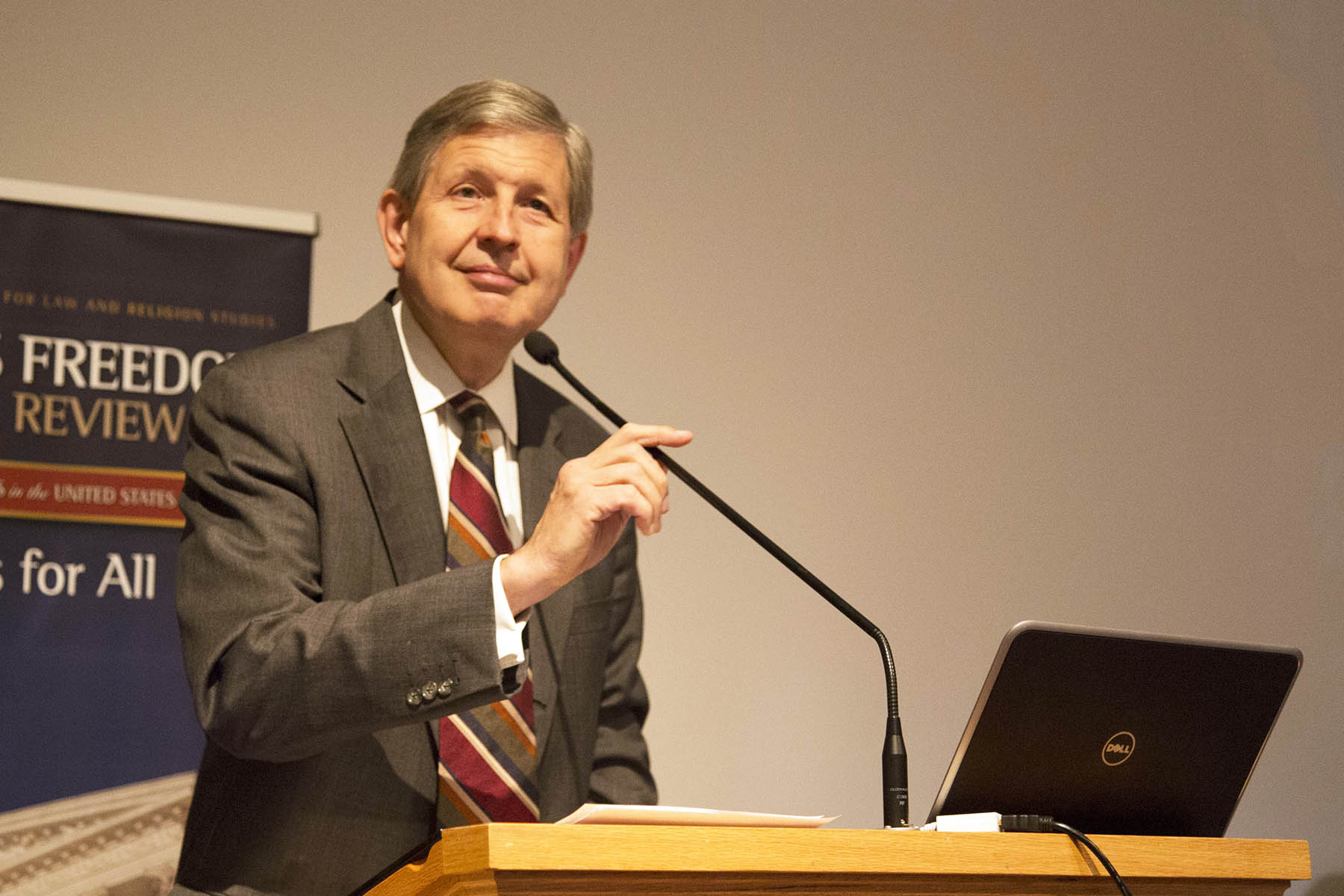
by Sarah Clifford
The Friday, 8 July 2016 afternoon plenary session, “Religious Freedom at the Supreme Court Now and in the Future”, featured two prominent attorneys, Hannah Smith, Senior Counsel, Becket Fund, and Gene C. Schaerr, Partner, Schaerr | Duncan, and Adjunct Professor, J. Reuben Clark School of Law, Brigham Young University. The speakers examined recent religious freedom battles won at the US Supreme Court level, and an optimistic outlook for future cases.
In her presentation, “The Roberts Court and Religious Freedom”’, Hannah Smith said that the Roberts Court has been largely protective of religious freedom. She provided both an overview of recent wins at the Supreme Court level and an illustration of how the justices have gone out of their way to demonstrate the breadth of protections to religious claimants. “There is a lot of reason to be optimistic, “ Ms. Smith said.
Gene Schaerr in his presentation titled “What Will the New Supreme Court Do on Religious Freedom?” gave an overview of the beliefs and philosophies of individual justices on the Rehnquist and Roberts Courts regarding the protection of religious liberty. Mr. Schaerr presented justice by justice voting records on cases concerning private religiously motivated conduct and cases concerning the sexual revolution. He advocated for the creation of clear legislation concerning predictable religious freedom issues. Mr. Schaer said that while the Supreme Court usually votes to protect religiously motivated conduct, they are much less reliable when issues arise out of the sexual revolution.
Cases cited in this session included Gonzalez v. O’Centra, Burwell v. Hobby Lobby, Little Sisters of the Poor v. Burwell, Stormans v. Wiesman, Trinity Lutheran Church v. Pauley, Holt v. Hobbes, Dale v. Boy Scouts of America, and CLS v. Martinez.
Religious Freedom Annual Review 2016 Friday Afternoon Closing Plenary: Current Developments in Europe
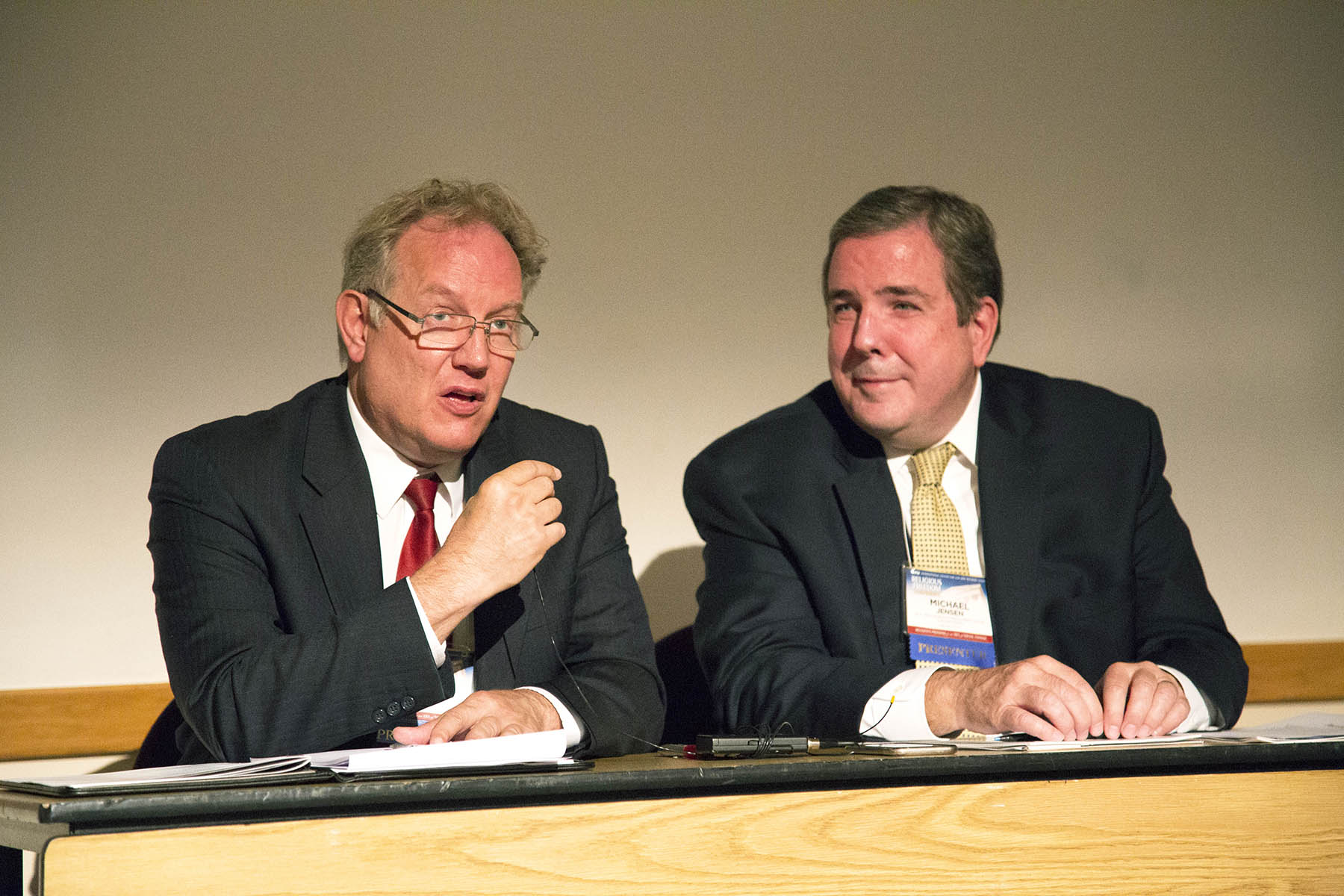
by Jedidiah Gibson
The Friday, 8 July 2016 closing plenary, Current Developments in Europe, featured David M. Kirkham, Senior Fellow for Comparative Law and International Policy, International Center for Law and Religion Studies, J. Reuben Clark Law School, Brigham Young University and Academic Director, BYU London Centre; and Michael L. Jensen, Area Legal Counsel, Office of General Counsel, The Church of Jesus Christ of Latter-day Saints. Both offered insight into religious liberty developments in Europe.
In his presentation, David Kirkham provided some tentative observations of how the recent Brexit referendum in Great Britain may effect Americans who are interested in religious liberty. His presentation focused on the special relationship and heritage America and Great Britain have shared throughout history, and the current political climate in both countries relating to immigration and security issues.
In discussing the current political climate in Great Britain, Professor Kirkham addressed how security and immigration issues such as potential bans and travel restrictions on Muslims and other ethnic and minority groups is an area of concern with respect to religious freedom.
He concluded his remarks by discussing how both countries have an elevated understanding of human rights and both countries’ role in protecting human rights in the future. Specifically, he addressed the push by some in Great Britain to withdraw membership from the European Court of Human Rights. Professor Kirkham advanced the idea that this is not because Great Britain is abandoning the protection of human rights, but instead because the country thinks it can do human rights better.
Michael L. Jensen discussed examples of current issues concerning religious freedom that the LDS Church has observed in Europe. First, Mr. Jensen addressed the great refugee crises currently unfolding in Europe. Specifically, he address a positive effect stemming from the crises—it has increased the dialogue about religious freedom with government and political leaders across the continent. Mr. Jensen also discussed some critical legislation pending that may pose a potential threat to religious liberty. One example was of an out-of-school education and counter terrorism initiative in the U.K. that, if passed, would allow for the government to monitor religious education programs for potential terrorist activity. This concerns the LDS Church because of its large seminary and institute of religion programs throughout the world.
Also discussed was the Equal Treatment Directive (ETD) which is currently being considered in the European Union. There are several areas of concern with ETD, one of which is the burden of proof that defendants accused of discrimination would carry in court. Also of concern, is the fact that anyone could bring a discrimination complaint against an individual or organization, not just the individual effected.
In sum, Mr. Jensen observed that although there are different concerns regarding religious freedom across the globe, there are similar solutions. These solutions involve concerned citizens and institutions monitoring new developments and working collaboratively with others to achieve common goals.